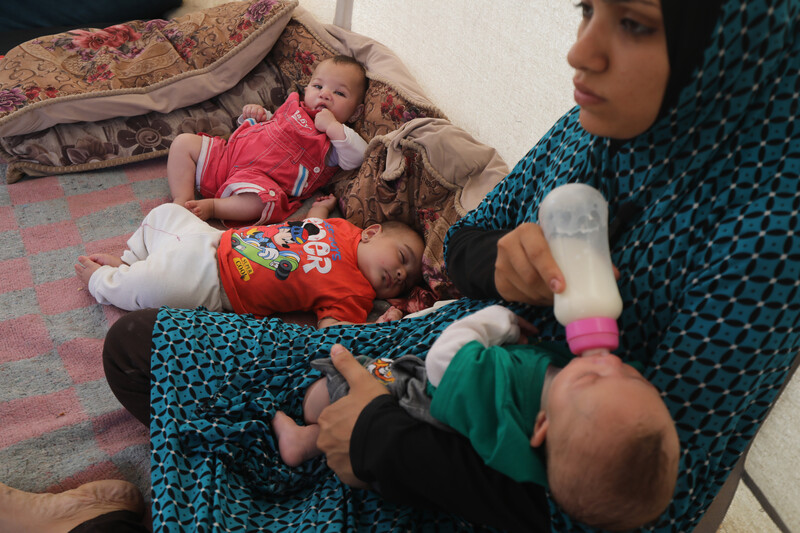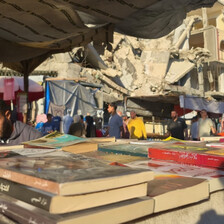The Electronic Intifada 23 May 2024

Gaza is the world’s most dangerous place for children according to UNICEF. Here, a mother feeds her baby in a tent for displaced people in Deir al-Balah on 30 April.
APA imagesWhat does it mean to be a mother in Gaza during genocide?
For Ola Odeh, 36, from the city of Khan Younis, it has meant losing her son and husband last October.
“My son Abdel Rahman was always asking me when we would go to my grandfather’s house. Will there be a truce soon or not? I made him be patient and pray a lot for this war to stop, but I was afraid that the army would target entire residential areas,” Odeh said.
Her 9-year-old son Abdul Rahman went downstairs with his father to sit with his grandfather and his cousins one day last October, she recalled.
“My daughter Masa was playing in her room, and I was arranging clothes in my room,” Odeh said. “Suddenly there was a huge explosion. I felt like I was on the street. I hugged Masa and looked around.”
“There were no stairs for me to go down, so I descended on piles of stones. They took me to the hospital, and I was crying hard. I wanted to see my son.”
She would never do so. He died along with his father in the blast.
“Don’t cry, mother,” Odeh recalled Masa saying at the time. “The most important thing is that you are fine and I am with you.”
“Losing Abdel Rahman was never easy,” Odeh told The Electronic Intifada. “I feel like my heart is on fire. I cry bitterly every night. He was a very affectionate child. He listened to my words and responded to my requests. … I feel that the war made me hate life.”
“The hardest thing is for a mother to lose her child,” Odeh said, echoing the thoughts of thousands of mothers whose children have been caught up in the genocidal violence unleashed in Gaza.
Of 14,500 children and 9,500 women reported killed, the United Nations, citing Gaza’s Health Ministry, has confirmed 7,797 child and 4,959 women fatalities in Gaza over the past nearly 8 months, saying there is incomplete documentation for the rest to make a final determination.
UNICEF has called Gaza the world’s “most dangerous place to be a child.”
Tears of a mother
“I still dream about his future. He was in the fifth grade,” Odeh said of Abdel Rahman. “He had many interests. He was the first grandchild of my family. They loved him very much. I still see my father’s tears and the pain in his heart over his loss.”
As she considers the future, Odeh added that she does not know how she will be both “a mother and father” to Masa.
“The screams and tears of mothers have never been merciful,” Odeh said.
Jawaher Hamid, 45, from Gaza City would likely agree. She lost her son Walid to deadly injuries suffered in a bombing in the Mawasi area west of Khan Younis.
“I was working in a school and cleaning its facilities in order to provide my children with what they needed. I was enduring extreme fatigue in order to help my son Walid to build a future for him,” Hamid said, adding that she had been hoping to see Walid get married and welcome his children into the family.
Last October, Hamid said she and her seven children fled from the intense bombing and left Gaza City, going to the Bureij camp in the middle of the Gaza Strip.
“It was not easy. I was displaced in schools, which are the most difficult places to go to. I could hardly get water and food for my seven children. Walid and his brothers were helping me, but they could not bear this extreme fatigue of displacement,” Hamid said.
“When tanks stormed Bureij camp, we were displaced again to the city of Rafah.”
Hamid recalled Walid telling her that he wanted to go to Khan Yunis to sell okra.
“He went … and he did not return. He came back to me covered in a shroud,” Hamid told The Electronic Intifada
”When the news came to me, my heart burned with a fire that made me lose the ability to speak.”
“Walid, my eldest son, was martyred. His passing hurt my heart and his father’s heart. I still have hope that everything I am experiencing will be a nightmare, and it will end,” Hamid said.
Her son was buried in a cemetery in the city of Rafah. His sisters, who did not move to the south, did not have a chance to say goodbye to him, Hamid said.
“They will not visit his grave because it is far from them, and when I return to Gaza City, his grave will be far from it.”
Unjust world
Hamid said had feared an Israeli military ground operation in Rafah, which would force her to be displaced a third time.
“I was praying to God that this would not happen, but it happened,” she said.
“I was displaced while looking behind me at Walid’s grave. I cried a lot. How would I be left with the sounds of tanks? Now I spend my time sitting by the sea. I cannot sit in the tent without Walid. I was hoping to endure all the hardships of war and not lose one of my children.”
Alaa al-Qatrawi lost all four of her children together during the Israeli army’s siege of their house next to Dar Al-Salam Hospital in Khan Yunis.
Al-Qatrawi, 33, said she had been separated from her husband for about a year. The children lived with their father and visited her weekly.
After constantly communicating with them to make sure they were ok since the start of the genocide, al-Qatrawi said she suddenly lost contact with her children in mid-December.
“The tanks were standing in front of their house. I waited a long time to check on them, but in March, I received news that the army had surrounded them and arrested their father and uncles and then bombed the house,” al-Qatrawi said.
“I lost my four children. I had a dream of being able to travel with them to Dubai and build a life and a future there.
“The occupation left my heart burning for my children,” she said. “Each one of them has a story of birth, upbringing, and care. Each one of them has a future and a dream that I hoped they could achieve. Each one of them has friends and family who love them and miss them. Is it possible for a mother to bear it? All of this in Gaza?”
“Unfortunately, we are in an unjust world that has no humanity at all.”
Ruwaida Amer is a journalist based in Gaza.





